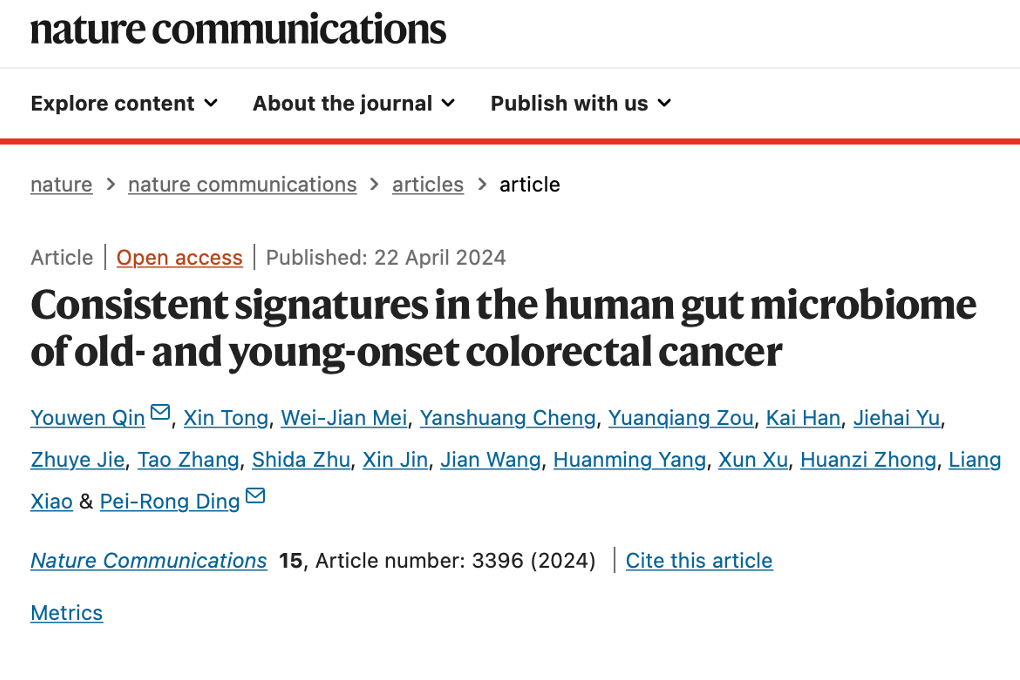A research team led by BGI-Research, in collaboration with Sun Yat-Sen University Cancer Center, first discovered that the fecal microbial characteristics of young colorectal cancer (yCRC) patients are consistent with those of older colorectal cancer (oCRC) patients. This provides a theoretical basis for the effectiveness of non-invasive colorectal cancer screening through fecal microbiota for those over 20 years old. This finding was released in Nature Communications on April 22.
 The study “Consistent signatures in the human gut microbiome of old- and young-onset colorectal cancer” was published in Nature Communications.
The study “Consistent signatures in the human gut microbiome of old- and young-onset colorectal cancer” was published in Nature Communications.
CRC is the third most common cancer worldwide, accounting for approximately 10% of all cancer cases and is the second leading cause of cancer-related deaths globally. Despite the overall incidence of CRC dropping due to widespread colorectal cancer screening in high-income countries, the incidence of young-onset colorectal cancer (yCRC), which occurs in individuals under the age of 50, is on the rise.
Over the past decade, research into the gut microbiome's role in colorectal cancer has attracted widespread attention. Previous studies have confirmed that the gut microbiome is closely associated with colorectal cancer. Many CRC-related bacteria are enriched in CRC. However, the samples in these studies mainly come from old-onset CRC (oCRC) patients. Therefore, the association between the gut microbiome and CRC in young patients has not been sufficiently studied.
This study shows that the composition of the gut microbiome has little to do with age in CRC patients. Utilizing BGI's sequencing platform, researchers analyzed the metagenomes from the fecal samples of 460 colorectal cancer patients, of which 167 are yCRC patients. Among the 25 bacterial species previously reported to be related to colorectal cancer, 24 were detected in both yCRC and oCRC samples, indicating they are not unique to a certain age group.
In particular, four bacteria species, which were proven to be closely associated with CRC in previous studies, were found enriched in both yCRC and oCRC samples compared to their age-matched controls.
In bacteria related to colorectal cancer, Fusobacterium nucleatum, Bacteroides fragilis, and Escherichia coli possess distinct pathogenic/virulence factors. To further understand the relationship between these bacteria and CRC, researchers utilize in-depth metagenomic data to analyze the diversity of those three bacteria at the strain level. This helps researchers more precisely understand how these bacteria are associated with CRC at the molecular level. Furthermore, these will be providing guidance for targeted treatments, early screening, and the development of related products in the future.
In addition, by analyzing microbiome data from a total of 1,922 fecal samples from this and publicly available source, researchers constructed multiple classifiers with machine learning to predict colorectal cancers. The prediction results were similar in both patient groups, suggesting that the gut microbial characteristics are similar.
Dr. Qin Youwen, the first author of this paper and a researcher at BGI-Research, said, "As people age, their gut microbiome undergoes changes. However, our study demonstrates that the influence of age on the gut microbiome is very limited in colorectal cancer patients. This finding not only further validates the close relationship between the gut microbiome and colorectal cancer but also provides strong support for the development of gut microbiome-based screenings for colorectal cancer."
Next, the research team is analyzing the follow-up data from CRC treatment processes and investigate the correlations between these microbial characteristics and the immune response to advance colorectal cancer treatment.
The study can be accessed here:



